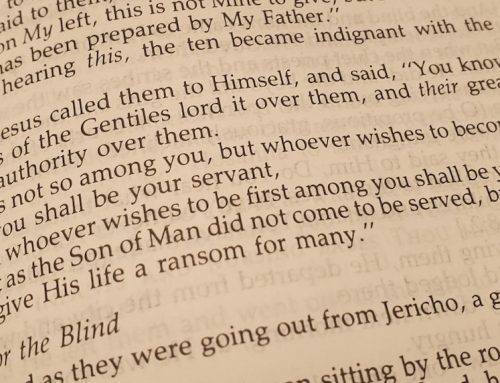The fierce wrath of God is used a lot by Stanton in their fear campaigns to recruit new members and keep them in line. This abuse of the fear of God, though, is not without cost. Former members and children of members are often left disenchanted with the God of the Bible. How could a loving God torture his own sons and daughters in this place we call hell? Their answer is usually either that there is no God, or if there is, he’s certainly not loving.
This age-old objection to the Biblical God due to his supposedly harsh judgment of hell is not unique to those who have been impacted by Stanton’s bad theology, unfortunately. Answers to this objection by believers have too often been clichéd and glib. But I think it’s far better to acknowledge that this is a legitimate line of questioning for those struggling to understand the God of the Bible. We don’t convince anyone in the relativist cultural soup of the 21st century by firing back with the same kind of harsh judgmentalism that they are recoiling from in the first place.
To be clear, tactics don’t trump truth. I hold the Bible as the ultimate authority on the matter. But does that mean God is a harsh and unforgiving lawgiver and dictator? Does a Biblical view of hell mean I’m a fundamentalist hell-fire-breathing judgmental Christian? Absolutely not.
If a fiery place of eternal torture for a few momentary wrongs in this life is what God has ordained, then I have to go with that, whether I like it or not. But I’m not so sure that is what the Bible teaches. In fact, I’m pretty sure it isn’t. Here are my thoughts at this point in my life. Take them or leave them. Feel free to agree or disagree, and comment if you have objections. I’m interested in hearing your views.
Is hell a physical place?
This is an important first question, and fortunately, it’s easily answered. Hell is clearly not a physical place (gasp—is Kevin a liberal?). We can know that with certainty, because hell is called a fiery lake of burning sulfer in Revelation:
Revelation 21:8 – But the cowardly, the unbelieving, the vile, the murderers, the sexually immoral, those who practice magic arts, the idolaters and all liars—they will be consigned to the fiery lake of burning sulfur. This is the second death.
But since a literal fire would emit literal light, and hell is also described as a place of darkness, we can reason that this is simply metaphorical language:
2 Peter 2:4 – For if God did not spare angels when they sinned, but sent them to hell, putting them in chains of darkness to be held for judgment;
Matthew 8:12 – But the subjects of the kingdom will be thrown outside, into the darkness, where there will be weeping and gnashing of teeth.
If hell is not a physical place, that means it does not occupy space and time. Perhaps we could describe it as a spiritual “place,” then. But what is that, really? Is that really just another metaphor? We honestly don’t know. That’s above our pay grade.
We have no way of defining or describing a spiritual “place” like heaven or hell other than by using materialistic words, which is like trying to describe an infite being like God in the language of finite humans. It can’t be done, and it’s why the Bible can be so easily misapplied and misunderstood when it comes to descriptions of the immaterial.
What’s the purpose of hell?
If hell is not a physical place, then whatever it is, we have limited capacity to understand it. Perhaps if we can’t understand the nature of it, we can at least come to understand its intent.
We’ve already agreed above that the “place” language is metaphorical, because a spiritual “thing” does not occupy space and time. But whatever hell is, I think we can also agree that its purpose is one of punishment:
Matthew 25:46 – Then they will go away to eternal punishment, but the righteous to eternal life.
Mark 9:43 – If your hand causes you to stumble, cut it off. It is better for you to enter life maimed than with two hands to go into hell, where the fire never goes out.
Now, before you atheists get all up in arms about the injustice of eternal “punishment,” read on. There’s more ground we have to cover, but I promise, I’ll come back to that.
What is heaven?
It’s impossible to define evil without a proper definition of good. Eastern philosophies developed the idea of yin/yang to explain this, although this concept falls extremely short of a truly moral view of good and evil. But that’s another subject. For now, we just need to understand that the presence of good helps define its opposite, evil.
Scripturally, heaven is described metaphorically, just like hell. Are there really streets of gold, or pearly gates, or a city foursquare, or is that figurative language to say “it’s breathtakingly awesome?” Will we really be singing literally around a literal throne for all eternity? I could get used to that, because I love to sing. To others, that sounds too much like a church service and they wouldn’t find that enjoyable at all! More on the enjoyment factor later, but the point is that heaven and hell are both described in materialistic terms, because that is all we can understand in the material world we live in.
It’s my understanding of scripture that heaven is simply being in the presence of God. It’s not a place, just like hell is not a place. If God is as the Bible says, the very definition of love and all that is good—then living in the presence of that goodness for all eternity seems like a very attractive thing to me. If I were able to glimpse into that “place,” I can only imagine what it would be like.
There are some verses that seem to equate heaven and God as a way of communicating the reality of an infinite God to the human mind, which has trouble comprehending anything other than finite material things.
Since the Jewish people maintained such reverence for the name YWH that they wouldn’t speak his name out loud, other words were used in its place. The word “heaven” became one of many substitute words, or euphemisms, like Lord, or The Almighty. For this reason, these passages make sense:
Matthew 21:25 – the baptism of John…was it from heaven or from men?
Matthew 23:22 – he who swears by heaven, swears by the throne of God and by Him who sits on it.
Luke 15:21 – I have sinned against heaven, and in your sight.
John 3:27 – A man can receive nothing, unless it has been given to him from heaven.
The word heaven is used in place of God in these passages. Isn’t being “in heaven” to be literally “in God” or “in the presence of God,” then? Both of these are accurate.
So if “going to heaven” means “going to be in the presence of God,” that puts a slightly different twist on things. But that slight difference makes all the difference.
If heaven is the presence of God, then hell is simply separation from God
This slight change in our understanding of heaven has major consequences for our understanding of hell. If heaven is the presence of God, then hell, it’s opposite, must simply be separation from God. This fits perfectly with what Paul says:
2 Thessalonians 1:9 – They will be punished with everlasting destruction and shut out from the presence of the Lord and from the glory of his might.
Just as the blessings of heaven are from being in the presence of the only source of ultimate goodness, the “punishment” of hell comes from the fact that we are cut off from that ultimate source of goodness. By being separated from God, we are separated from love, joy, peace, compassion, justice—everything good that we could possibly think of. Because goodness is God’s nature. He is not just loving. He is love.
This separation from God and everything that is good is the best explanation of total darkness, or wailing and gnashing of teeth, or a lake of fire, that I can think of. But the important thing here is that the darkness and the torment is all of a person’s own choosing. Why would a loving God force someone to live in his presence eternally after death if they didn’t want anything to do with him in life?
So do people really “choose” hell?
How many of you ladies reading this have ever had a suitor who wanted a relationship with you, but you just weren’t interested? He started by writing you notes, or bringing you flowers, or asking you out to coffee. Maybe he tried buying you tickets to an event to try to spend time with you, or gave you nice gifts.
You knew he wanted to get to know you, and he was certainly persistent and nice, but you just had other interests. So you start getting more and more clear in your rejection. When you see him coming in the distance, you walk away to avoid crossing paths. When you have even a casual opportunity to talk to him, you don’t.
How would you like him to behave at this point? If he truly loves you, don’t you think he should walk away and stop pestering you at some point? If he truly loves you, even if he had the power to force you to spend time with him—for eternity, no less—wouldn’t it be unloving for him to do so? Even if he knows he could make you happy beyond your wildest dreams, if you aren’t convinced of that, doesn’t true love let you choose for yourself?
God wants a relationship with us, his creation. But he created us with that pesky little thing called free will. True love allows free will. God didn’t make us little robots who have no choice but to love him. He wants us to love him because he’s good. He wants a relationship because he knows that’s the best thing for us, not because he’s some narcissistic megalomaniac in the sky, as the New Atheist movement tries to suggest.
So how can a loving God send someone to a place of eternal torment? Think about it. Isn’t it very consistent with a loving God to let people choose whether to reciprocate a relationship with him or not? I don’t believe the “torment” is something God is positively doing to those separated from him. It’s simply the natural consequences of choosing to live one’s life away from the source of all goodness. Hell may just be the ultimate example of the wisdom in the saying to “be careful what you ask for, because you just might get it.” Those who don’t want a relationship with God in this life aren’t going to suddenly want it when they die. God is just giving them what they wanted, what they chose.
God has made himself known to mankind through creation and revelation in order to draw us to him. We can look up at the vastness of the universe, and even a child knows they had to have been created by an intelligent mind. We have to force ourselves to unlearn that in order to accept the preposterous idea of a universe from nothing with no creator.
God even appeared to mankind throughout human history with messages to help guide them into a relationship with him. Angels, prophets, a chosen people to bring about Jesus. Through Jesus, God actually came to Earth to live as one of his own creation to make his case in the flesh. But instead, mankind killed him.
All of that, and so many still choose to reject him. The good thing for those who want a relationship with him is that he’s a loving and good God. He’ll take you back and meet you where you are. The bad thing for those who don’t is also that he’s a loving and good God. He won’t force us to choose his goodness in heaven any more than he force us to choose it on Earth.
What about justice?
I don’t know about the the God you were raised to believe in, or the one you have in your mind’s eye when you think about hell, but the God I would trust with my life is the ultimate source of goodness and love. Without the morality that proceeds from his nature, we as humans would have no sense of right and wrong, let alone justice.
Who are we to charge God with injustice when it’s his nature and morality that defines it? If we are all just molecules, there is no right or wrong, just preferences for you and preferences for me. Despite many attempts to ground an objective morality in something other than God, philosophers agree that it can’t be done.
So whatever justice there is in this world or the next, we know that God has to be the source of it. For that reason, I wouldn’t get too caught up in issues where you think God is one way, but it doesn’t seem fair that he would do something else. The truth is, he can do anything he wants. Any “rules” you think he has, you understand imperfectly; besides, he can wave the penalty for them if he wants to, for whatever reason. Will he? And for the reasons we want him to? That’s his call, not ours. There is very little we know about how God will judge mankind. But what we can know without a doubt is that he will judge justly and in love.
He won’t force anyone to be in his presence for eternity if they didn’t even want that in their short time on Earth. That would not be loving. He’s also not going to send anyone who is truly innocent of wrongdoing away from his presence for all eternity. That would be unjust, and God cannot be unjust. So this is where some level of trust comes in that, whatever we don’t know, God will right the injustices in the world. I do believe we can trust that with our lives.
I realize these points don’t provide answers for all circumstances, and for some, these may not be entirely satisfactory answers. But if you’ve been wanting to explore a relationship with the God who created you, but have been turned off by misinformation about him so far, maybe this is enough to give him another try. I pray that it is!







Kevin I'm unclear about whether you are saying there is/is not a hell. But I did find it interesting that my understanding of heaven's description was that human terms were used to describe it in the bible but that it wasn't necessarily like that. However, it never occurred to me that hell was also described in terms a person could understand but wasn't necessarily that way. Interesting that I hadn't made that connection. I was at class tonight and a neat preacher was visiting. It was an excellent class. He too has a blog and I liked his discussion on… Read more »
Very cool, I'll check it out. Yes, I believe there's a hell as the Bible teaches, I just don't think the descriptions are literal. How could they be since they are describing what is ultimately a spiritual reality that has no comparison in our material world.
The thing is the bible is comparing elements of the physical world with the spiritual world in its description of the lake of fire. I understand on its face it appears illogical for a person to be in utter darkness in a perpetual fire which one would think would emit light. However, in the lake of fire (sulfur) we may think of a person dog paddling in the lake therefore having their head above the lake of fire and being able to see due to the light of that fire, which is doubtful. I would believe that a person would… Read more »
Anon 1:06, I think the important point here, though, is that heaven and hell are not material. Therefore, they do not occupy space and time, which means they are immaterial realities. States of of consciousness, maybe? I don't know, I think that world is unfathomable to mortals.
Totally agree Kevin with scoc and the constant reminder how hell is real and all but the few will end up there. That actually got my attention more than anything thinking back at the nonmember classes that sucked me into the cult. Using the account of Noah and the great flood how only 8 were saved. I believe it's in Zechariah 13:8-9 how only 1/3 would make it and the rest would be cut off. And of course Matthew 7:13-14 few there be that find it. Other accounts used to strike fear into those who attend even the first time.… Read more »
"There are only two kinds of people in the end: those who say to God, 'Thy will be done,' and those to whom God says, in the end, 'Thy will be done.' All that are in Hell, choose it."
~The Great Divorce, C.S. Lewis
Looking at a congregation picture of Tacoma looks like little to no growth over the past two years. No surprise. Also as I showed the picture to a friend they recognized how unhappy the people looked. Few smiles.